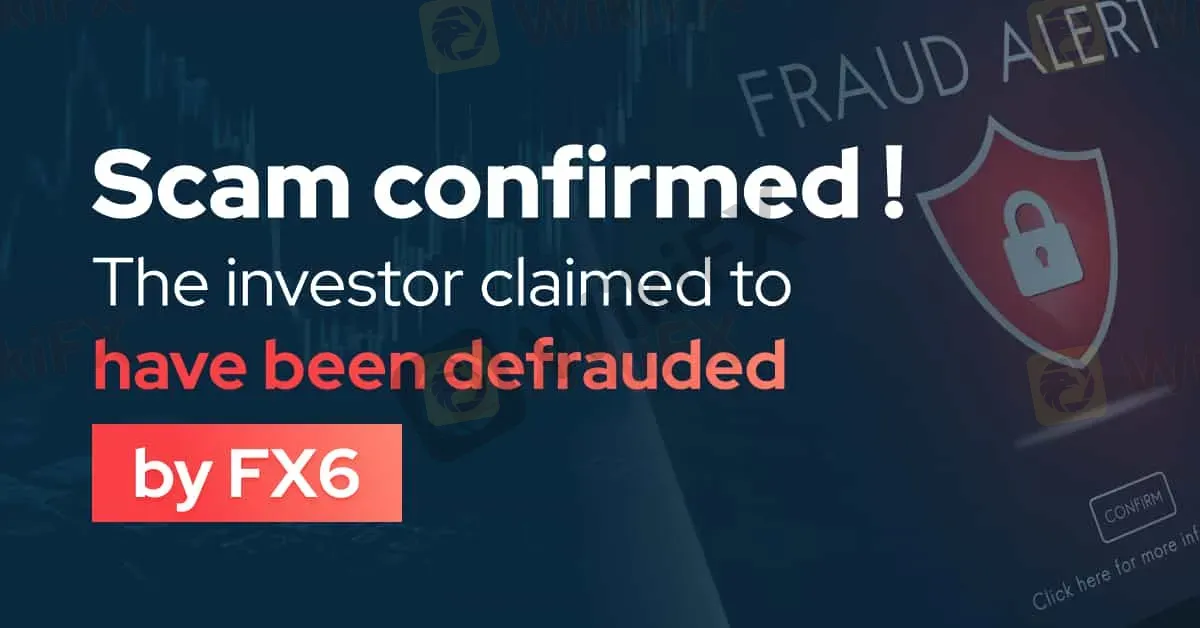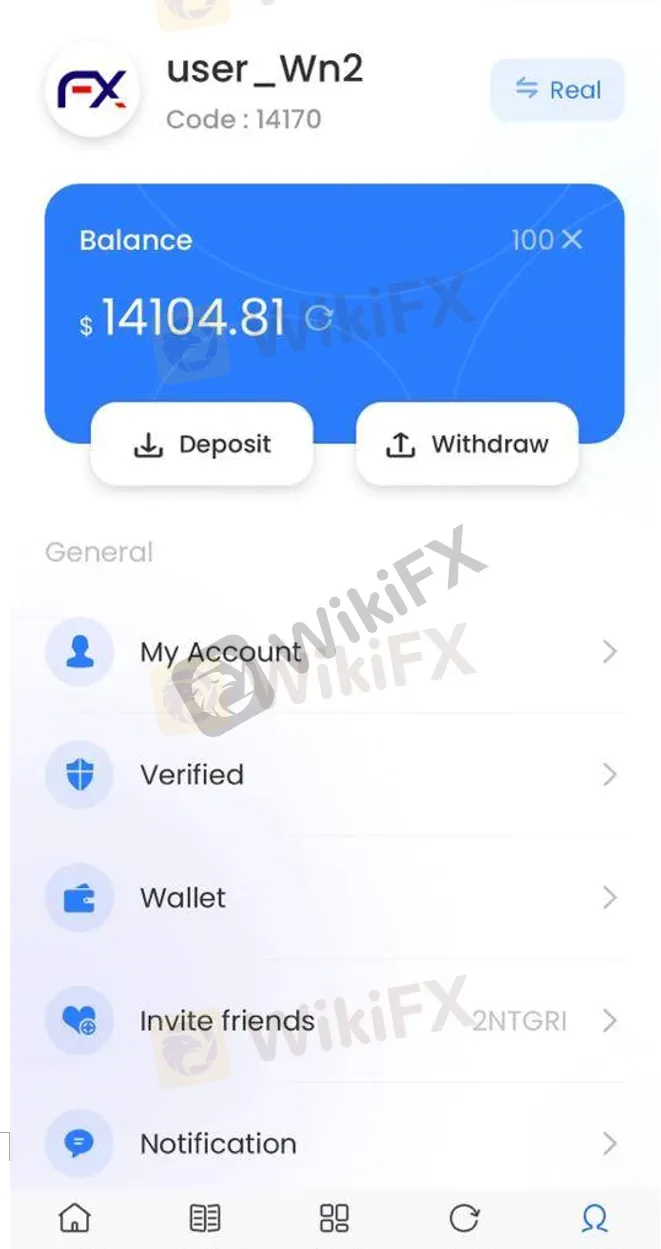简体中文
繁體中文
English
Pусский
日本語
ภาษาไทย
Tiếng Việt
Bahasa Indonesia
Español
हिन्दी
Filippiiniläinen
Français
Deutsch
Português
Türkçe
한국어
العربية
Scam confirmed! The investor claimed to have been defrauded by FX6.
Abstract:Protecting the legitimate rights and interests of forex traders is always the primary concern of WikiFX. Online trading offers opportunities for individuals to invest and potentially earn profits. However, it also poses the risk of falling victim to fraudulent activities. In this article, we delve into a shocking case of fraud involving the unregulated forex broker FX6, as recounted by an investor who claims to have been defrauded.

Protecting the legitimate rights and interests of forex traders is always the primary concern of WikiFX. Online trading offers opportunities for individuals to invest and potentially earn profits. However, it also poses the risk of falling victim to fraudulent activities. In this article, we delve into a shocking case of fraud involving the unregulated forex broker FX6, as recounted by an investor who claims to have been defrauded.
About FX6
FX6 is a forex broker registered in China, but its reputation is far from pristine. A quick check on WikiFX reveals that this broker has received an alarmingly low score of 1.08/10, and there have been more than ten complaints filed against it in recent times. These red flags point to a disconcerting pattern of behavior.

The case in detail
One investor, who wishes to remain anonymous, reached out to WikiFX to share his harrowing experience with FX6. He narrates a tale of deception and financial exploitation that began with a seemingly innocuous online encounter.
“I met a person on Facebook after a short period of acquaintance. He told me about trading, and I admitted that I knew nothing about it. He assured me, 'I will teach you little by little.'”
The investor was enticed by the promise of financial growth and agreed to give trading a try, albeit hesitantly. His troubles began when he trusted the wrong individual.
Deceptive Gains and Ominous Promises
The first steps into trading with FX6 were cautiously taken, with a small investment and meager profits. But this was merely a prelude to a much larger and more sinister scheme.
“After a brief period, the individual told me to look for $6,000, promising to loan me an additional $6,000 and send it to my address within the FX6 application. I scraped together the money from friends and sent the $6,000 to my FX6 account.”
With $12,000 at his disposal, the investor took a leap of faith and engaged in further trading. Initially, it seemed like his decision had paid off as his account balance swelled to $14,000. However, this apparent success quickly unraveled, revealing the true nature of FX6.





The Scam Revealed
When the investor decided to withdraw $3,000 to repay a friend who had lent him money, he found himself caught in a web of deception.
“I waited for my funds to reach my Binance account, but they never did. When I contacted FX6's customer service, they claimed there was a blockchain issue and demanded a $850 deposit to rectify the problem. Helpless and desperate, I paid the amount.”
The investor's ordeal did not end there. FX6 continued to manipulate the situation, demanding an additional $350 in fees to hire an IT engineer who would supposedly solve the problem. With growing suspicions and doubts, the investor refused to make any more payments and began a thorough investigation.
“I conducted extensive research on FX6 and uncovered their fraudulent activities. Armed with evidence, I confronted them, but they retaliated by freezing my account and blocking my WhatsApp number.”
The investor's pursuit of justice revealed the true nature of the person who had initially introduced him to FX6 - an accomplice in the scam. His attempts to expose the fraudulent operation were met with intimidation and silence.




Conclusion
The case of this defrauded investor serves as a stark reminder of the risks associated with unregulated forex brokers. FX6's alleged deceptive practices, as evidenced by numerous complaints and a dismal WikiFX score, paint a grim picture for prospective traders. It highlights the need for vigilance and due diligence in the world of online trading and the importance of consulting reputable sources before entrusting hard-earned money to any broker.
WikiFX exposed this case to the public to remind all traders of the potential risks. All traders should be vigilant when investing in a broker.
WikiFX is actively reaching out to the victim and other traders hoping to find more evidence to help resolve the problem. Please stay tuned for more information.
WikiFX keeps track of developments, providing instant updates on individual traders and helping investors avoid unscrupulous brokers. If you want to know whether a broker is safe or not, be sure to open WikiFXs official website (https://www.WikiFX.com/en) or download the WikiFX APP through this link (https://www.wikifx.com/en/download.html) to evaluate the safety and reliability of this broker!

Disclaimer:
The views in this article only represent the author's personal views, and do not constitute investment advice on this platform. This platform does not guarantee the accuracy, completeness and timeliness of the information in the article, and will not be liable for any loss caused by the use of or reliance on the information in the article.
Read more

IG Group Enters Direct Investment Market with £160 Million Freetrade Buyout
IG Group, a prominent global financial trading and investment company, has announced its acquisition of Freetrade, a commission-free investment platform, for £160 million. The deal, funded through IG’s existing capital resources, marks a strategic move to expand its footprint in the United Kingdom.

Mitrade Ensures Trader Protection Backed by Lloyd's of London
Mitrade boosts trader confidence with a Lloyd's of London-backed Excess of Loss Insurance Policy, ensuring top-tier protection and transparency in CFD trading.

How a Promised RM1.4 Million Return Turned into a Costly Scam
A 39-year-old online trader from Malaysia has reportedly lost RM252,004 to a fraudulent investment scheme. The scam, which promised a lucrative return of RM1.4 million within two months, has left the victim facing substantial financial loss.

BitMEX Fined $100M in U.S. for Anti-Money-Laundering Violations
BitMEX fined $100M for anti-money laundering and KYC violations. The case highlights the U.S. crackdown on crypto platforms ignoring Bank Secrecy Act rules.
WikiFX Broker
Latest News
How Long Can the Dollar Remain Strong?
Forex Price Trend Prediction! | Come be a New Year Price Winner!
HFM NY Special Offer!
How a Promised RM1.4 Million Return Turned into a Costly Scam
Cinkciarz.pl Under Fire: Frozen Accounts, Missing Funds
First Unfair Trading Case Reported Under South Korea’s Virtual Asset User Protection Act
“Predict and Win” Big Rewards! Join the Contest Now
"Jumped Deposit Scam": New Wave of Financial Fraud in India
South Korean President Yoon Suk Yeol's Arrest Shakes Markets
Titanium Capital LLC Ponzi Scheme: Henry Abdo Admits Fraud, Impacting Over 200 Investors
Currency Calculator






